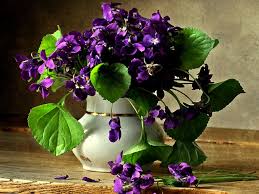Flower Power!
To be overcome by the fragrance of flowers is a delectable form of defeat. ~Beverly Nichols
The language of flowers, sometimes called floriography, is a means of cryptological
communication through the use or arrangement of flowers. Meaning has
been attributed to flowers for thousands of years, and some form of
floriography has been practiced in traditional cultures throughout
Europe, Asia, and the Middle East. Plants and flowers are used as symbols in the Hebrew Bible, particularly of love and lovers in the Song of Songs, as an emblem for the Israelite people, and for the coming Messiah. In Western Culture, William Shakespeare ascribed emblematic meanings to flowers, especially in Hamlet, Prince of Denmark.
Interest in floriography soared in Victorian England and in the United States
during the 19th century.
Gifts of blooms, plants, and specific floral
arrangements were used to send a coded message to the recipient,
allowing the sender to express feelings which could not be spoken aloud
in Victorian society. Armed with floral dictionaries, Victorians often exchanged small "talking bouquets," tussie-mussies,
which could be worn or carried as a fashion accessory. (Wiki)
Tussie Mussie
“Tussie-mussie” is a quaint, endearing term from the early 1400s for
small, round bouquets of herbs and flowers with symbolic meanings.
Benefits of Floral Scents and Essential Oils:
Rose
Rose essential oil is considered to be the floral counterpart of
lavender as therapeutic essential oil. Indeed, it serves a wide array of
purpose in aromatherapy with its anti-viral and anti-infectious
properties. Among the various conditions it is able to treat include
depression, stress, sprains, wounds, aging or sensitive skin, insomnia,
and other ailments relating to the female reproductive system.
Rose Geranium
There are several helpful properties contained in rose geranium essential oil
that makes it ideal for use in aromatherapy. Aside from its uplifting
and relaxing effect on the body, geranium essential oil contains
antiviral, antibacterial, decongestant, and antidepressant properties.
Beautiful Vintage Tins add character & simplicity to a single variety of flowers
Melbourne International Flower & Garden Show
I love going to the Melbourne International Flower & Garden Show as it is such a wonderful inspiration to see the beautiful work of so many talented people. I always leave feeling
so happy & motivated!
My Inspiration!
Flowers
have spoken to me more than I can tell in written words. They are the
hieroglyphics of angels, loved by all men for the beauty of their
character, though few can decipher even fragments of their meaning.
~Lydia M. Child

I'd rather have roses on my table than diamonds on my neck. ~Emma Goldman
"forgiveness is the perfume of
the violet on the heel that crushed it"

Ingredients
4
sprigs
lavender
(no flowers)
25
grams
granulated sugar
150
grams
butter
75
grams
caster sugar
(extra for sprinkling)
200
grams
plain flour
Method
Strip the lavender leaves from the stems to make a heaped
tablespoonful.
Add the granulated sugar and whiz them in a processor.
Set aside until required.
Chop the butter into the processor bowl, add the caster sugar and whiz until soft and light. Add the flour and the lavender/sugar mix and process again until a dough forms.
Turn onto a floured surface and shape into a sausage approx 2"/5cm
diameter. Wrap tightly in foil or film and place in the refrigerator for
at least a couple of hours until firm or overnight.
Heat the oven to 190 deg C/375 deg F/Gas 5.
Taking a sharp knife slice off the dough into discs approx 1/4"
thick and place onto a greased baking sheet. Bake for 8 - 10 minutes
until pale golden colour.
When baked, remove from the oven onto a cooling rack and sprinkle
with the remaining sugar. Once cool, store in an airtight container. (Nigella Lawson recipe)
"Just living is not enough," said the butterfly. "One must have sunshine, freedom and a little flower."
Author: Hans Christian Andersen